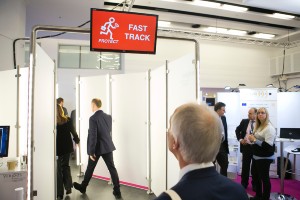Border security technology project shortlisted for THE Awards 2020
16 September 2020

A University of Reading project that could make border security checks quicker and safer during the COVID-19 pandemic has been shortlisted in the Times Higher Education (THE) Awards 2020.
PROTECT uses advanced facial recognition technology to identify people as they move through border control at places such as airports or when entering large venues, making the kinds of checks usually done manually fast and contactless, reducing queues and the risk of infection.
The project is shortlisted in the Research Project of the Year: STEM category of this year’s awards, becoming the third Reading research project to be shortlisted in the last two years.
Professor James Ferryman, a computer scientist at the University of Reading who leads the PROTECT project, said: “I am pleased that PROTECT has been shortlisted for this prestigious award as it has the potential to be an important project to the global recovery to the pandemic.
“Secure and safe international borders will be critical to getting the world back on its feet, and the PROTECT technology has the potential to reduce the risk of infection faced by passengers at airports worldwide.
“Users simply open an app before being scanned on the move, meaning no queuing at eGates passport desks and potentially zero contact with others.”
“The PROTECT technology has the potential to reduce the risk of infection faced by passengers at airports worldwide." - Professor James Ferryman, University of Reading
The PROTECT project is backed by €5m EU Horizon 2020 funding and began in September 2016, in collaboration with more than 50 stakeholders.
In collaboration with the UK Home Office and Border Force, the PROTECT system has been tested at two international borders – the EuroStar terminal at London St Pancras railway station and with the Polish Border Guard in Kętrzyn, Poland. It has informed the EU’s installation of ‘corridors’ at borders across Europe, and is set to be expanded for use on public transport and access points to sports stadiums.
Chris Hurrey, Senior Consultant at Intrepid Minds Ltd and former Assistant Director at the UK Immigration Service (now UK Border Force), said: “The University of Reading’s coordination of the PROTECT project has brought one of my dreams as a border technology professional to life: allowing an increasing number of known international travellers to move quickly through a secure and closely-monitored border control without queueing or stopping.
“Despite the current biosecurity situation, passenger numbers will keep on increasing, along with the expectations of passengers for easy and non-intrusive border crossing. PROTECT has brought together existing and emerging technology in biometrics and sensing to prove in a public demonstration at busy St Pancras International Terminal that the careful use of personal data and on-the-move biometrics can reduce delays to passengers and yet ensure that problem travellers are not overlooked.
“Once border control areas are full of self-service biometric passport gates, a new solution will be needed to cope with the increasing numbers: PROTECT provides a prototype for just such a solution.”
“The University of Reading’s coordination of the PROTECT project has brought one of my dreams as a border technology professional to life" - Chris Hurrey, former Assistant Director at the UK Immigration Service
Ian Neill, of Agile Security Partners, who has 35 years' experience in border management, including roles with UK Border Force and a lead on Heathrow Airport, said: "The PROTECT project offered both insight and practical alternatives to the current methods of border crossings. It has demonstrated how a fused approach to passengers’ data and their biometrics can promote radically different options to challenge both the current thinking and use of infrastructure for border transactions.
"Its relevance in the current climate has been amplified in the way it allows passengers to clear the border process securely while minimising the need for traditional person to person transactions.”
THE success
The University of Reading has been shortlisted in the THE Awards in each of the last three years. In 2018, Professor Mathew Nicholls was recognised in the Most Innovative Teacher category for bringing Classics to life for his students through his virtual reality model of Ancient Rome.
A hattrick of entries were shortlisted in 2019, with Dr Madeleine Davies (English Literature) making the Most Innovative Teacher list for her innovative online learning journals.
Two Reading entries made the Research Project of the Year shortlists: Professor Rosa Freedman in the Arts, Humanities and Social Sciences category for her work with the UN keeping children safe from abuse, and Dr Rebecca Emerton and Dr Andrea Ficchi (Environmental Science) in the STEM category for their work advising the UK Department for International Development on flood forecasts in Mozambique that year, which helped mitigate their impact.
Henley Business School, based on Reading’s Whiteknights campus was also nominated in the Business School of the Year category in 2015.
